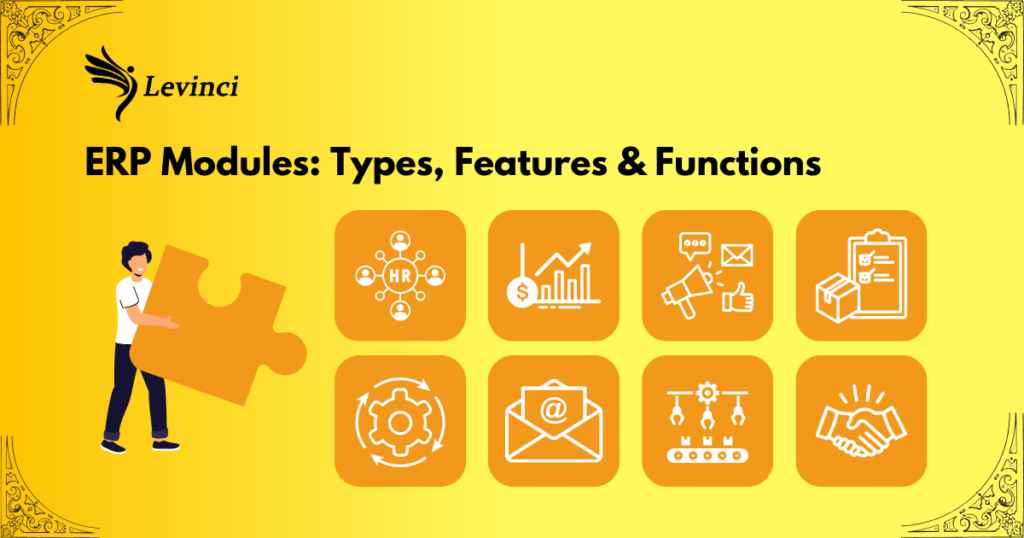Imagine a company like a house. An ERP system helps connect all the rooms (departments) to work together. These systems aren’t one big thing, but smaller pieces that handle specific tasks. This article will explain what these pieces (ERP modules) are and what they do.
What are ERP modules?
An ERP (Enterprise Resource Planning) system is basically a big software suite that helps businesses manage all their different departments and functions. It’s kind of like having a central nervous system for your company.
ERP modules are the individual building blocks that make up an ERP system. Think of them like organs in a body. Each module is designed to handle a specific business area, such as finance, human resources, inventory, or manufacturing. These ERP modules work cohesively to centralize data, automate operational processes, and improve communication and collaboration efficiency between different departments.
>>> Read more: Why ERP is important? Why do many companies use enterprise resource planning ERP software?
06 common ERP Modules and their features
Supply Chain Management
The Supply Chain Management module focuses on optimizing the flow of goods and materials throughout a company’s supply chain. Product-related processes, such as returns, exchanges, or refunds, can all be managed through the supply chain management module.
Specifically, this module will track every step in the process of transporting materials and goods throughout the entire supply chain, from supplier to manufacturer to final distributor to retailer or consumer.
Besides, the Supply Chain Management module can streamline the purchasing process by automating tasks like requesting quotes, managing supplier relationships, and placing purchase orders.
Customer Relationship Management (CRM)
CRM module allows users to store and manage detailed information about customers, including names, addresses, phone numbers, email addresses, and purchase history. Moreover, CRM modules provide visibility into the sales pipeline, allowing users to track the progress of deals through various stages of the sales cycle.
CRM systems often integrate with marketing automation tools to manage marketing campaigns, track campaign effectiveness, and segment customer lists for targeted marketing efforts.
Finance
The Finance module is the cornerstone of an ERP system, providing a central hub for managing a single system. This module provides a comprehensive solution to help automate accounting processes, and improve efficiency and accuracy in financial management such as invoices, payment proposals, taxes, expenses, etc. The finance module will manage collections from customers and payments to reports.
Manufacturing
With a manufacturing module, you can plan and schedule production runs based on forecasted demand, material availability, and production capacity. This can involve features like creating production schedules, allocating resources, and sequencing production steps.
Throughout the manufacturing process, this module also helps users track raw materials, work-in-progress (WIP), and finished goods inventory levels. It may also include features for setting reorder points, optimizing inventory storage, and managing just-in-time (JIT) inventory strategies.
In addition, production management software can provide error warnings and predict machine maintenance, helping businesses quickly resolve problems to ensure uninterrupted production. The main features of this module include Production planning, Production resource coordination planning, Workshop and factory management, Production order management, Product cost calculation, etc..
Human Resources Management
This module streamlines and centralizes all the tasks involved in managing a company’s workforce and contains detailed records on all employees, including performance reviews, job descriptions, benefits selections, and attendance/time off.
Additionally, it automates payroll processing, manages employee training and development programs, and generates reports on key HR metrics, such as employee turnover, absenteeism, and training completion rates.
An HRM module within an ERP system can significantly improve the efficiency and effectiveness of HR processes, allowing HR professionals to focus on strategic initiatives and employee engagement.
E-commerce
An increasingly important module for modern businesses, the e-commerce module helps manage all aspects of online sales within an ERP system. The e-commerce module allows users to manage product information for their online store, including descriptions, images, pricing, and inventory levels. This module also helps users easily process online orders, tracks order fulfillment, and integrates with shipping carriers for efficient delivery.
Other ERP Modules
Inventory Management
An Inventory Management module within an ERP system is the central hub for tracking and managing all of your company’s stock. It ensures you have the right amount of inventory in the right place at the right time, which is crucial for smooth operations and customer satisfaction.
This module also helps you with serial number tracking, inventory control, bar code printing, inventory valuation, build materials and kitting, and SKU management.
Order Management
The Order Management module ensures order accuracy by automating tasks like order processing, inventory allocation, and shipment tracking from preparation, fulfillment, and shipping to customers. This module was developed to prevent lost orders and increase on-time delivery rates. Therefore, it can significantly enhance customer satisfaction and accurately determine order fulfillment costs.
Warehouse Management
The Warehouse Management module has the function of optimizing the flow of goods within your warehouse, ensuring efficient use of space, labor, and resources. It helps automate tasks like receiving, storing, picking, and packing inventory. This translates to significant cost savings and improved order fulfillment times.
Furthermore, by utilizing features like barcode scanning and optimized picking routes, it minimizes errors and streamlines the entire picking and packing process. Additionally, real-time inventory visibility allows for better allocation and reduces the risk of stockouts.
Marketing Automation
It streamlines repetitive tasks and personalizes your marketing efforts across multiple channels like email, website, social networks and SMS, allowing you to reach the right audience at the right time with the right message. Furthermore, the Marketing Automation module also provides detailed reports on campaign performance, helping you plan and determine future marketing targets.
Functions of ERP Modules
The functions of ERP modules can vary depending on the specific software and the needs of the organization. Here are some key functions of ERP modules across different departments:
- ERP modules integrate data from various departments within a company, eliminate the need for multiple standalone systems and ensure everyone is working with the same information.
- By automating tasks and streamlining processes, ERP modules can significantly improve efficiency across the organization. For example, ERP modules can automate the process of generating invoices, reducing the time and effort required by the accounting department.
- ERP modules provide real-time data and insights into all aspects of a business. This allows managers to make better-informed decisions, identify and address problems quickly, and track progress toward goals.
- ERP modules can help to reduce errors by automating tasks and eliminating the need for manual data entry. This can lead to improved accuracy in financial reporting, inventory management, and other areas.
Conclusion
ERP modules play an important role in managing and optimizing business operations. Currently, there are many different types of ERP modules, each playing different roles, but in general, these modules help businesses improve efficiency, reduce errors, and provide valuable insights for better decision-making. Deploy ERP modules effectively and improve business performance with Levinci now!







